By Antonia Egli (Irish Institute of Digital Business, Dublin City University)
MARGISTAR has been out and about this autumn. Shortly after a first in-person meeting with Working Group 2 in Türkiye, Working Group 1 members met in Albania this October. Read on for a short overview of our COST Action meeting, along with a glimpse of the Albanian peaks and valleys we were lucky to visit.
On the 5th and 6th of October 2023, MARGISTAR’s Working Group 1 (WG1) members met in Albania to discuss collaboration and networking opportunities within the COST Action. WG1 focuses on identifying and connecting with the most important mountain stakeholder groups in each country to co-create solutions for marginalised mountain areas. WG1 is also responsible for developing the platform for this network, which is called the FAIRWAY in Europe platform.
What is MARGISTAR’s FAIRWAY in Europe?
FAIRWAY in Europe is an online platform that serves to promote MARGISTAR’s work in marginalised mountain areas by connecting MARGISTAR members with key mountain stakeholders in a virtual space. Over the next three years, FAIRWAY, which is further detailed in our MOU, will be actively used for joining mountain stakeholders from civic society with those from science and policy spheres. Our aim is to enable an online dialogue in support of marginalised mountain areas and mainstream sustainable transformations beyond the MARGISTAR project.
“FAIRWAY in Europe will be an inclusive vehicle that people can use to meet EU level sustainability targets.”
MARGISTAR Action Chair Prof Juha Hiedanpää, Luonnonvarakeskus (Natural Resources Institute Finland – LUKE)
The larger part of the WG1 meeting in Albania was dedicated to agreeing on the platform’s design principles and identifying desirable features and functionalities, all against the backdrop of resource constraints for such platforms with COST Actions. The discussion was based on three categories and 15 sub-topics as per the figure below.
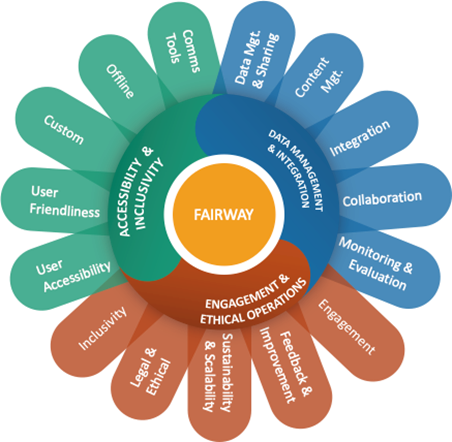
FAIRWAY Platform Design Principle Discussion Framework
WG1’s vision for FAIRWAY is an online, visual, and inclusive space that supports international communication, collaboration, and community-building. In addition to FAIRWAY, we discussed whether MARGISTAR should establish an open data portal for datasets specifically related to marginalised mountainous areas. We expect to commence closed group testing on the FAIRWAY platform in late November 2023 before a wider launch to the MARGISTAR consortium in early 2024. Be sure to sign up to the MARGISTAR newsletter for more details on the platform’s progress and upcoming launch over the next few months.
The MOVING Project – Protecting Natural Sites
WG1 also had the pleasure of welcoming two external guests. The first, María del Mar Delgado-Serrano from the University of Córdoba, provided an overview of the four-year MOVING (MOuntain Valorisation through INterconnectedness and Green growth) project funded by the Horizon 2020 programme. MOVING aims to build capacities and co-develop relevant policy frameworks across Europe for the establishment of value chains that contribute to the resilience and sustainability of mountain areas to climate change. The MOVING consortium consists of 23 expert partners (including research centres, rural developers, industry representatives, and innovation agents) and focuses on 23 reference regions in 16 countries.
In 2022, Blanca Casares, as part of MOVING, carried out a study to investigate how the presence of protected natural sites affected value chains across its 23 mountain regions. 43.5% of MOVING’s reference regions said that protected natural sites constrained mountain value chains as they introduced stricter regulations on business activity and prevention, land, and resource use, as well as tourism and visitor management. Nonetheless, most respondents (82.6%) also said that the presence of natural areas brought economic, environmental, and social opportunities. A detailed summary of the study can be found in the full report here.
Breathing Life into Ghost Towns – The Alberghi Diffusi Initiative
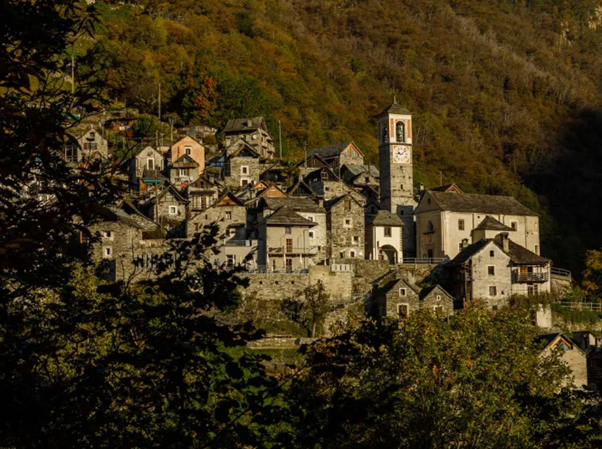
An example of “diffused hotels” in Corippo, Italy
Our second guest speaker was Dr Brunilda Licaj, who introduced us to the Alberghi Diffusi initiative, which seeks to regenerate rural towns through tourism. In her words, the project sought to “breathe new life in to ghost towns.” The initiative is based on an Italian model that uses uninhabited houses and buildings for accommodation, or so-called “diffused hotels.” The model requires existing hotel services that are managed centrally, as well as residential/accommodation units in several buildings in an authentic environment with an active community/settlement. AD Balkan is a project that commenced in 2010 and began a diffused hotel in Kruja Castle in 2021; it is now evaluating a further ten candidate villages. Dr Licaj noted that while AD Balkan competes with many existing accommodation offerings, it also complements them, and the business model can accommodate existing offerings as part of a wider alliance. While it is still early in the project, the diffused hotel concept may be a potential pathway to a post-marginalised community and therefore it is an initiative that MARGISTAR will be watching closely over the remainder of the COST Action.
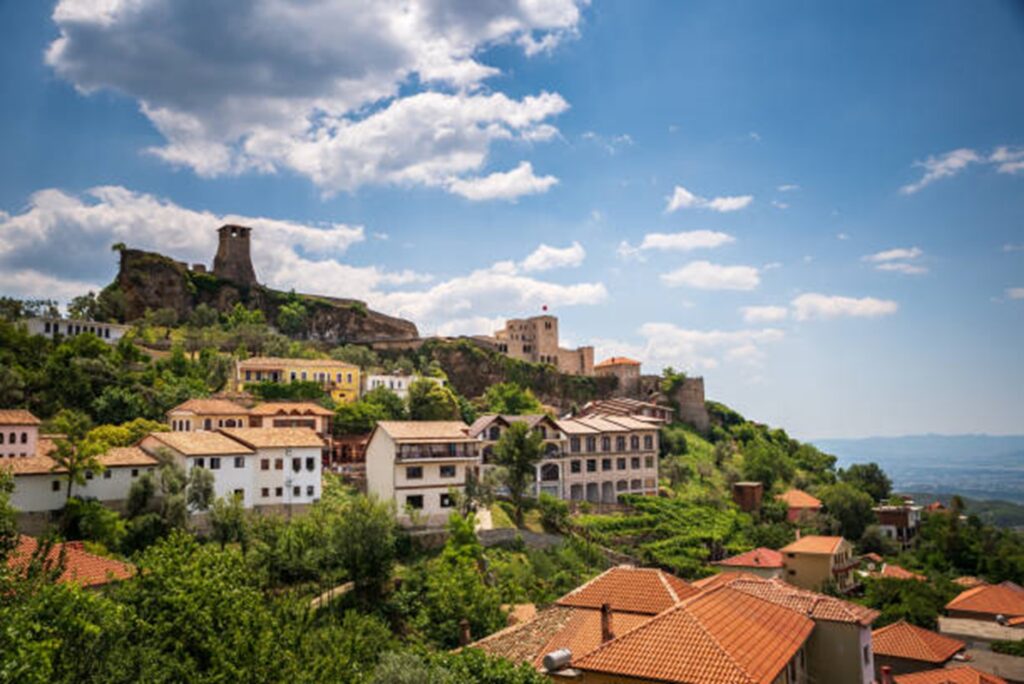
Kruja Castle – a diffused hotel – near Tirana, Albania
Albania: A Glimpse into Rural Transformation
While discussions surrounding the future of MARGISTAR’s FAIRWAY in Europe platform filled most of the time spent in Albania, the recent trip also offered a unique window into the country’s history and ongoing rural transformation. Beyond MARGISTAR’s meetings, our journey took us to the heart of Tirana and the mountain landscapes of Voskopojë and Korçë, demonstrating the multifaceted challenges and current efforts towards post-marginalisation visions in Albania’s rural mountain areas.
Tirana, the capital of Albania, provided us with a first-hand look at Albania’s complex past. There, two significant landmarks today serve as testaments to the nation’s tumultuous history: Bunk’Art 2, a communist-era bunker now transformed into a museum, and the Pyramid of Tirana, once a symbol of totalitarian power and now a young and vibrant cultural hub. Both sites reflect Albania’s transformation from a closed, communist society to an opening nation.
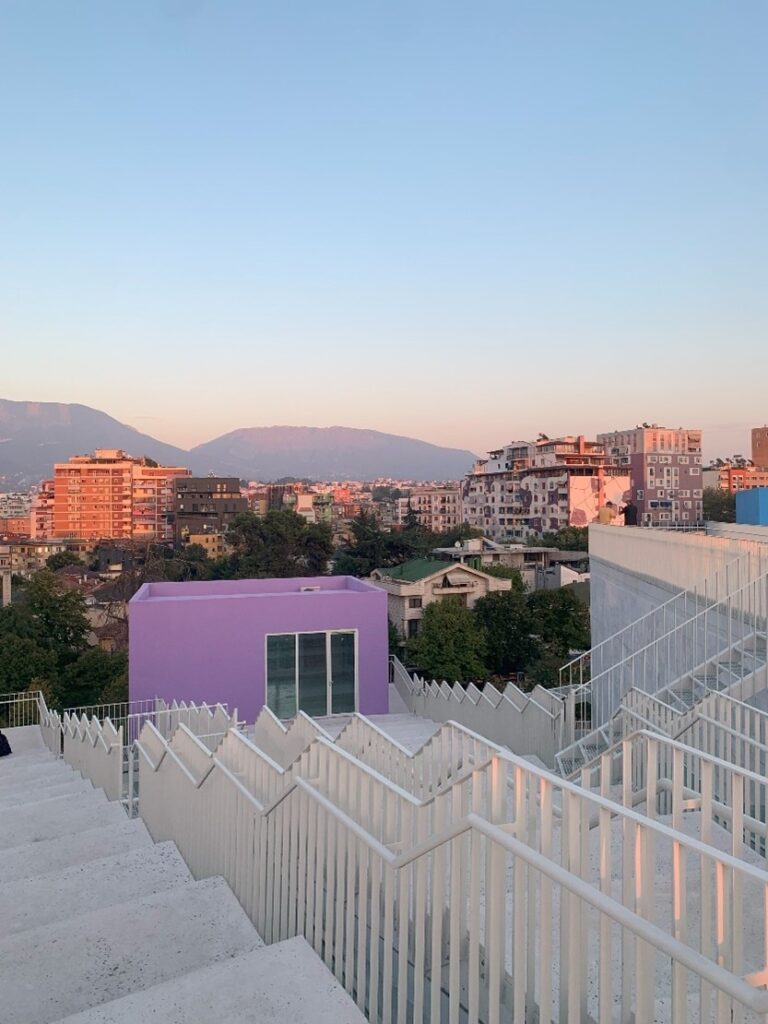
The Mountains of Tirana, visible from the top of the Pyramid of Tirana
Tirana’s evolution parallels the progress witnessed in the other locations of MARGISTAR’s meetings. Our journey took us to Lin, a village in the country’s Korçë region and home to Oher Lake, surrounded by cliffs that house the ruins of the Basilica of Lin. The basilica dates to the 6th century and boasts a remarkably well-preserved mosaic floor. Archaeological findings in Lin and Oher Lake have been dated to be 8,000 years old, making the village a likely contender for the location of the oldest settlement in Europe and contributing significantly to the thriving tourism sector in this region.
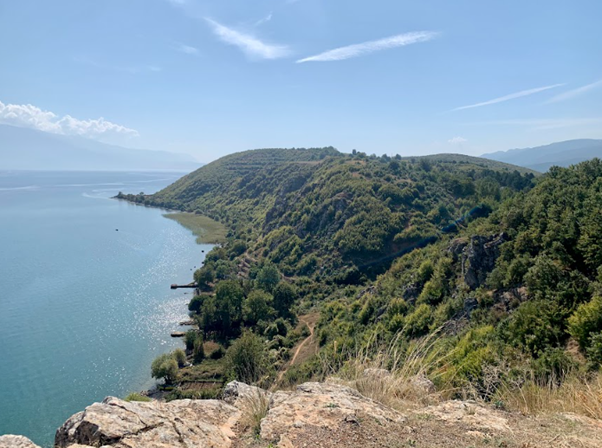
MARGISTAR at Oher Lake
Meetings then continued in Voskopojë and Korçë, also known as the “City of Museums,” which are both renowned for their cultural and intellectual heritage. In the 18th century, Voskopojë emerged as a centre for education, religious studies, and Aromanian Christianity trade. The town’s legacy lives on through its well-preserved Orthodox churches, making it an attractive destination for tourists interested in Albania’s cultural history.
Such examples of rural tourism demonstrate its pivotal role for Albania’s economy. The landscapes and traditional way of life in rural areas attract tourists and foster a source of income for local communities. Rural tourism has empowered Albanians by creating employment opportunities in various sectors such as hospitality, agriculture, and handicrafts. The influx of tourists then stimulates local businesses, leading to the growth of small enterprises that cater to the needs of visitors. The economic impact finally extends beyond the tourism sector, positively influencing related industries and promoting a more equitable distribution of wealth.
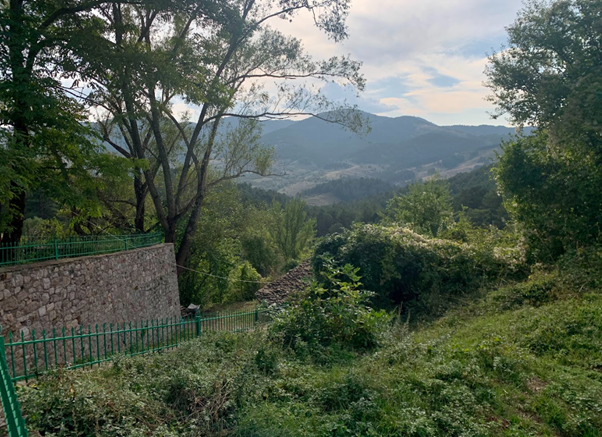
The peaks surrounding Voskopojë village
Seeing Albania’s rural areas once again demonstrated to MARGISTAR the value of living museums as a reflection of a nation’s complex journey towards post-marginalisation. Our trip with MARGISTAR provided us with valuable insights into the economic and cultural significance of rural tourism in Albania, further emphasising the need for thoughtful development and preservation in this emerging sector.


